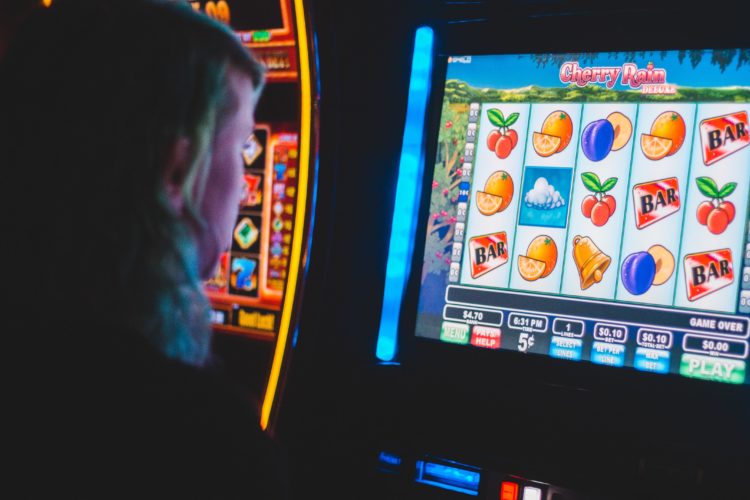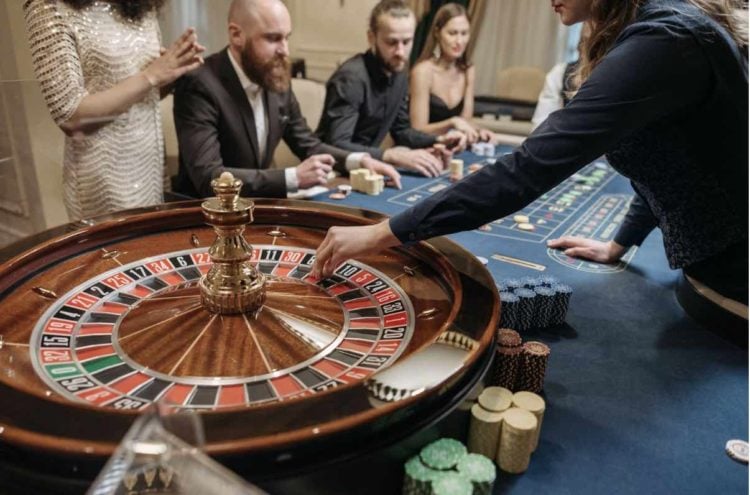
Gambling addiction affects almost eight million people in the United States alone. Addiction to gambling is a mental disorder characterized by a persistent and obsessive need to engage in gambling despite negative consequences. That being said, the term “gambling” these days encompasses a wide variety of activities outside of traditional casino settings. Today, the vast majority of gambling happens online and on mobile apps. Opening a gambling app on your phone or visiting a gambling website on your computer may be as simple as clicking a few buttons, depending on the state you live in. Addicts, however, place wagers in every imaginable setting, from casual handshake wagers to high-stakes wagers at casinos and sportsbooks.
But how do you know if you or a loved one has a problem? At what point does what used to be occasional fun turn into a full-blown gambling addiction? Here are the 10+ signs of a gambling addiction you should look out for.
HOW DO YOU DEFINE A GAMBLING PROBLEM?

First of all, let’s define what it means to have a gambling problem or addiction.
Addiction to gambling is characterized by a lack of self-control while knowing that one’s compulsive behavior is harmful to themselves and others and that the chances of winning are low. The more you gamble, the more you want to gamble, and the riskier your bets will become. This occurs whether you are betting on sports or playing cards.
To reiterate, the incessant urge to gamble despite negative consequences is the hallmark of compulsive gambling. Gambling problems may disrupt personal and professional lives. Not only that, but, unsurprisingly, a gambling addiction can also put a significant financial burden on the person suffering from it.
Those with a gambling addiction may use even their large wins to continue betting until they are broke. The biggest problem today is that gamblers have the option to gamble at all hours of the day and night. Thanks to the proliferation of gaming websites and casinos, the barrier to entry is extremely low. For people who are addicted, excitement comes from taking risks. This changes their mental state and gives them an extreme high. Like a heroin addict, a gambler’s life gets consumed by their addiction.
SIGNS OF A GAMBLING ADDICTION

So, let’s jump into the signs to look out for that may signify a gambling addiction.
1. NEGATIVE FEELINGS OR DEPRESSION AFTER PLAYING
The truth is that some people can enjoy gambling without any ill effects. Non-addicts will play the slot machine only as long as they can afford to lose, at which point they will walk away.
On the flip side, there is simply no way for an addict to just stop. That is the primary distinction between a gambler who occasionally partakes and one who is addicted.
Compulsive gambling, like other addictions, is a way to deal with stress. Unfortunately, the act of gambling itself may bring on a whole new set of unpleasant feelings, even if you’re only trying to forget about a stressful circumstance. When you’re not gambling, your brain’s reward region doesn’t get its usual supply of “feel-good” neurotransmitters. This causes gambling addicts to experience feelings of lethargy, irritability, and depression.
2. OBSESSION OVER THE GAME OF CHANCE
All pathological gamblers suffer from a lack of self-control, leading to an unhealthy preoccupation with gambling and the prospect of winning. So, even if you aren’t currently gambling, the thought of doing so has crossed your mind. You can’t help but think about your past betting experiences and fantasize about what you’d do with the money. The thing is that, even if you do win, you always end up gambling away your winnings, so you never get to actually do things. These thoughts may become more intrusive and upsetting over time.
3. PEOPLE ARE TELLING YOU YOU HAVE A PROBLEM
Sometimes it takes time for those closest to a gambler to realize they have a problem. You should pay attention to the advice of others if they tell you that you have a problem. Because if you don’t, you might not find out until it’s too late.
In most cases, individuals resist coming to terms with the fact that they have a problem. They have been telling themselves falsehoods for so long that they have difficulty believing anyone who tells them the truth, no matter how close they are. When those closest to you express worry about your activities or behavior, it’s time to give it some serious thought.
4. NEGLECTING THE RISK OF LOSING
Gambling addicts can’t resist the impulse to gamble even when their problems worsen financially or face legal repercussions. One possible explanation for their continued gambling is a hope that a “big win” may save them from their financial woes. The sad truth is that gambling addicts get a rush from gambling, whether they win or lose. This is why it will take more than a sizable loss for them to finally call it quits.
5. SHOWING SIGNS OF WITHDRAWAL WHILE NOT GAMBLING
Those with compulsive gambling tendencies may have just as much difficulty recovering from withdrawal as those with drug dependencies. Recognizing the symptoms of gambling withdrawal might be helpful in dealing with it. When it comes to behavioral addictions, researchers have shown that there is a broad spectrum of withdrawal symptoms that may be classified as either physical or emotional. When a person with a gambling addiction abstains from gambling, even for a day, they may experience emotional withdrawal symptoms. Examples of such symptoms might be:
- Depression
- Cold sweats
- Anxiety
- Loss of appetite
- Restlessness
- Low sex drive
When experiencing withdrawal, gamblers think that they need to gamble in order to feel normal or happy again. This is why it’s vital for gambling addicts to realize there is a variety of options available to help them overcome issues of addiction.
6. DYSFUNCTION IN DAILY LIFE
Besides the financial consequences of gambling, gamblers may also deal with dysfunction in other areas of their life. Gamblers may have issues with work, may even lose their job, and struggle to maintain healthy relationships with friends and family. Some signs to look out for include:
- They often ask to borrow money.
- They are unable to keep up with general household admin, such as cleaning and paying bills.
- They only keep easy-to-prepare snacks and meals in the house.
- They lie regarding their gambling habit.
- They have made unsuccessful attempts at cutting back on or stopping gambling.
And on top of these more obvious signs of dysfunction in daily life, people with gambling addictions may also deal with mental consequences, such as low self-esteem, anxiety, stress, and depression. They are also more likely to develop a substance abuse problem.
7. GAMBLING DESPITE CONSEQUENCES
It’s no secret that gambling can lead to problems and consequences in your life, including financial difficulties, relationship issues, and even a loss of a job, as mentioned above. However, these consequences will not affect those with a gambling addiction. It will take so much more than these severe consequences for someone to quit gambling due to the high gamblers get – no matter if they win or lose.
8. FINANCIAL PROBLEMS
Of course, another major sign of a gambling addiction is the presence of financial problems that result from compulsive gambling. Someone who used to be financially stable may suddenly have a lot of problems with their finances, which may result in getting loans and asking loved ones for money.
However, despite these mounting pressures of financial issues in their lives, those with gambling addictions cannot stop gambling. In fact, there may be a strong belief that gambling will eventually solve all of their money problems, as a “big win” may be just around the corner.
9. BREAKING THE LAW TO GAMBLE
Those with a gambling addiction may break the law in order to gamble. Once they’ve gambled away their own money, a gambler will resort to stealing and committing fraud in order to get more money to fund their dangerous habit. And due to breaking the law, this leads to even more severe legal consequences including jail time! If you or a loved one has resorted to breaking the law in order to fund the gambling, it’s high time for an intervention and some help!
10. GUILT AFTER GAMBLING
In many cases of gambling addiction, gamblers may feel guilty or remorseful after gambling. This is generally because the gambler already has a notion that they may have a gambling problem. For this reason, they feel guilty every time. However, this guilt is not enough for them to stop gambling altogether.
11. DENIAL
Another symptom a person with a gambling addiction may have is straight-up denial. Denial is actually a pretty common sign of all sorts of addiction, including a gambling addiction. When a gambler is in denial, they are adamant that they do not have a gambling problem. Due to this denial, it is hard to intervene when a loved one has a gambling addiction – even if you have the evidence to back up your claim. We highly recommend seeking professional help for a proper intervention if you want to help.
12. LYING ABOUT GAMBLING
Those with a gambling addiction may also lie about their gambling issues. As the gambling problem progresses, it’s only natural for friends and family to start coming out worried for the gambler’s well-being. So, in order to combat this, many gamblers will begin to lie and hide their gambling. And since it’s hidden behavior, it can be harder to spot a gambling problem, as only the addict themself will know what’s really going on.
HOW TO STOP A GAMBLING ADDICTION

Once you have determined that you or a loved one has a gambling addiction, it’s time to take action and stop the gambling addiction before it further disrupts the gambler’s life.
Here are our top tips for helping to stop a gambling problem:
- Understand you have a gambling addiction: The first step to recovery is to recognize that you have a problem in the first place. Go over all the 12 signs of gambling above, and see if you recognize them.
- Understand the triggers: What triggers you to go and gamble? In other words, what are the reasons that you gamble? Triggers can be anything from drinking, certain friends, and specific feelings you may have. Write down these triggers so you understand them.
- Avoid high-risk situations: Cut up your credit cards, do not take out loans, do not carry around large amounts of money, stay away from casinos and gambling sites, and delete any sportsbook or gambling apps.
- Pick up a new hobby: Prevent yourself from getting bored by picking up a new hobby. In this way, you are replacing a bad habit with a good one.
- Learn how to deal with stress: Find techniques that better equip you to deal with stress. You can try various techniques, such as breathing exercises and yoga.
- Seek professional help: Of course, the best thing you can do when battling a gambling addiction is to ask for help. Your loved ones can help as well, but nothing substitutes professionals who are equipped to deal with your specific situation.
FAQ
Is Gambling Bad for Mental Health?
Gambling in and of itself is not bad for your mental health, but if it becomes an addiction, it can lead to a whole host of issues, including stress, anxiety, and depression. Gambling can also affect the part of your brain that releases dopamine.
Who Is More Likely to Be Addicted to Gambling?
Generally, young men and adolescents are more likely to become addicted to gambling.
Is a Gambling Addiction Genetic?
While the addiction itself is not genetic, genetics can strongly influence the likelihood and possibility of developing a gambling addiction down the line.
LEARN HOW TO STOP GAMBLING AND GET HELP TODAY
Getting sober is difficult, but with the right therapy and a strong support system, it is possible. Without the aid of experts who have guided others through the process before, it may be difficult to take the first steps toward recovery. Friends and family who are there for you are essential to getting well, but they may not know how to assist in the best way. So, if you recognize one or many of the signs of a gambling addiction above, seek help before it gets any worse!
- 23 SUPER FUN 4TH OF JULY GAMES - April 23, 2024
- 30 FUN DATE NIGHT GAMES FOR COUPLES - April 18, 2024
- 200+ INSANE “KISS MARRY KILL” QUESTIONS TO ASK - April 16, 2024